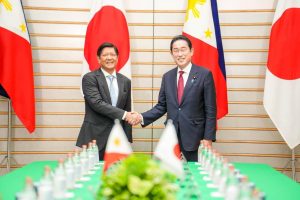Philippine President Ferdinand Marcos Jr.’s official visit to Japan from February 8 to 12 was aimed at strengthening and evolving the Philippine-Japanese strategic partnership based on contemporary trends in the international and regional geopolitical landscape.
Japan is a natural and highly crucial partner of the Philippines, given both countries’ support of the established rules-based order in the Indo-Pacific. Moreover, Manila and Tokyo also share similar threat perceptions of a rising and more assertive China, given that both often find themselves at the receiving end of Beijing’s power projection and strategic maneuvers in the South and East China seas.
Accordingly, Marcos will not only seek to bank on his predecessor’s declaration that the Philippine-Japanese strategic partnership was entering a golden age, but also attempt to broaden and deepen the scope of the bilateral partnership in the realms of both economics and defense at a time of growing geopolitical turbulence.
Economically speaking, Japan’s importance to the Philippines’ development and growth is historical, well-acknowledged, and consistent. Japan is the country’s second largest trade partner and also its largest source of bilateral official development assistance (ODA). Based on a 2021 report from the National Economic and Development Authority, Japan had 45 ongoing or completed ODA projects in the Philippines, while China only had five.
In the context of infrastructure, while the Belt and Road Initiative (BRI), China’s mega infrastructure investment program, continues to gain significant attention, Japan continues to maintain its role as the largest infrastructure investor in Southeast Asia.
While China’s BRI has attracted significant criticism because of its unsustainability and disregard for international macroeconomic stability, leaving its partners with greater economic burdens, Japan’s economic engagements are rooted in its vision of a free and open Indo-Pacific. This translates to transparent, democratically led, and rules-based projects. Moreover, while China’s vast financial institutions outweigh Japan’s, the latter offers countries long-term loans with low interest rates to ascertain the sustainability and resilience of the projects.
Moreover, of the many infrastructure investment pledges that China made to the Philippines under the administration of President Rodrigo Duterte, only a few have materialized. In contrast, Japan has been a key contributor to Duterte’s Build, Build, Build (BBB) program, funding big-ticket ventures such as railway projects. It is in this context that Manila must maximize its burgeoning economic partnership with Japan, given its relatively large infrastructure deficit, which is reflected by the current government’s “Build, Better, More” program. As Japan seeks to expand its economic footprints across the Indo-Pacific, the Philippines, being a like-minded partner, must proactively leverage its strengthening ties with Tokyo.
Defense cooperation serves as another pivotal element in the strategic partnership between the Philippines and Japan – one that has significant potential to expand further given Prime Minister Fumio Kishida’s increasingly security-driven foreign policy, which continues to be catalyzed by the rising threat brought by an assertive and nuclear armed China and North Korea.
Accordingly, during their meeting last week, Marcos and Kishida signed a key defense agreement, which will permit Japanese troops to take part in training exercises to address issues revolving around natural disasters and humanitarian needs in the Philippines. Such an agreement could pave the way for more robust cooperation and more frequent interactions between the Japanese and Philippine militaries, which will also complement the recently agreed arrangement between Manila and Washington to grant the United States more access to Philippine bases under the Enhanced Defense Cooperation Agreement.
Moreover, at a time when Japan also seeks to strengthen and promote its arms industry, the Philippines can benefit from the possible easing of restrictions for technology transfers to boost its ongoing military modernization program. Additionally, the Japanese Foreign Ministry is set to get around $15.2 million in April to help bolster the defenses of like-minded partners in the Indo-Pacific. Such an initiative can be effectively tapped by Manila.
Japan’s practical understanding of international politics and regional affairs also converges well with the Marcos’ independent foreign policy rooted in the notion of proactive autonomy. Being an immediate neighbor of China, Japan is aware of the geopolitical risks involved in Beijing’s growing strategic maneuvers in the Western Pacific; however, Tokyo also emphasizes the need to maintain open diplomatic channels of engagement with its large neighbor in order not to upset unnecessarily the already fragile regional security architecture, while also putting great importance on enhancing deterrence.
Moreover, further developing strategic relations with Japan can potentially help deepen Manila’s defense engagements with other like-minded Indo-Pacific powers, such as India. In fact, as a reflection of their growing strategic ties, Japan, the Philippines, India, and the U.S. conducted a first ever quadrilateral naval exercise in the South China Sea in 2019. The potential for similar trilateral or multilateral engagements is growing, given the growing convergence of interests among these democratic countries.
The growing momentum in Japan-Philippines relations is an optimistic sign for both countries and suggests that more opportunities can be maximized in the near future. Prioritizing ties with Japan will therefore not only allow the Philippines to improve its national material capabilities, but also will serve as a proactive platform to improve Manila’s centrality and diplomatic networks further amid the geopolitical shifts taking place in the Indo-Pacific.

































